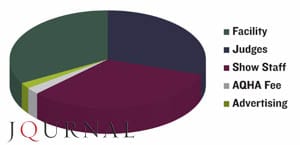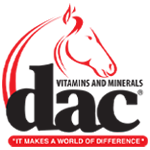You’re at a horse show, writing the check to cover your expenses and fees. “Someone,” you think as you furiously scribble in the dollar amount, “is making a lot of money on me and my horse.”
Maybe not. Horse shows incur a lot of expenses, and in most cases, the managers are just passing the costs on to you.
Let’s break down some of the costs of putting on a horse show.
- Facility rental. You like a nice facility, don’t you? One with big stalls, lots of warm-up arenas and plenty of parking? Maybe some showers and hookups and attractive grounds? The more amenities a facility has, the more expensive it will be, and some shows charge for additional stall cleaning, electricity or grounds fees. Some facilities and fairgrounds charge for the use of additional warmup arenas. Those fees differ in different parts of the globe.
- Judges. There’s not a horse show without a judge, and shows pay judges an average of $500 a day plus overtime, in addition to paying for transportation and food. Paying for the judge is the most important expense a horse show has.
- Advertising. If shows want to let folks know when and where to bring their horses, those shows need to advertise. And some exhibitors really like ribbons, which is a form of advertising and an expense the show will have to pay ahead of time.
- Show approval fee. AQHA charges its shows an application fee for show approval ranging from $150 to $1,500, depending on how big the show was the previous year, plus an additional $4 per horse that actually enters. That money pays for processing – the amount it costs AQHA for its employees to enter the accomplishments of all the horses at the show into the Association’s database.
- The help. The announcer, ring crew, ring stewards, show manager and office staff all need to be paid. Those people and the judges also need places to stay, and hotel prices can fluctuate.
A Case Study
So let’s say the show you’re attending is a smaller weekend split-combined show, just two days and two judges, no cattle. Show secretary Chris Darnell of Ohio provided the Journal with 13 years’ worth of records of exactly that sort of two-day show – an outdoor one in northern Ohio – as a reference. We’ve averaged them to come up with these expenses.
Advertising – $240
AQHA show approval – $220
Facility – $3,987
Judges – $4,226
Show staff – $4,275
———————
Total – $12,948
Your small local horse show is $12,948 in the hole before the first horse has set a hoof on the grounds.
That’s where the entry fee comes in. If the show charges a flat fee of $150, that show needs 87 exhibitors just to break even.
Your entry fees repay the local show committee for their costs of the facility, the judges, the show approval/processing fees and the help.
That’s it.
If your local horse show committee has really hustled and found sponsorships and a lot of volunteers to work the gate or help with announcing, the show might break even. It might even make a little money to put in the bank to help pay for next year’s show.
Additional Fees
When you write your check to the show, a few additional fees are going to be part of the sum:
- Water/electric hookups/parking fees. If you hook your living-quarters trailer or camp on a fairgrounds, you’ll need to pay for that use. Some shows charge a little more than they are charged so they can make some money back.
- Stall fee. Stall fees pay for the amount it costs the facility to clean your stall before and after you use it. Some of that money goes to the facility, but stall fees are where a show can make up some of its expenses.
- Shavings. Some facilities will allow horse owners to bring bedding from home. Some will not. If the facility sells bedding, the facility will receive that money.
- Drug-testing fee. AQHA charges $5 per horse per judge, with $1 going for processing costs and $4 going toward the cost of drug testing. For one horse at a show with two judges, that’s $10, with $8 of it going toward testing. Processing the test of a single horse costs $315. You might not see drug testers at your show, but your money is going into a pot to pay for the 1,500 tests in 42 states that were conducted in 2014.
CLICK HERE for more from AQHA.com









